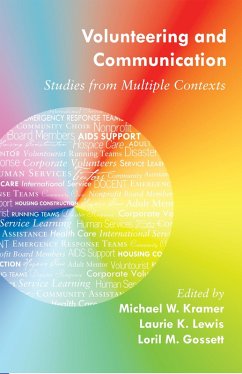This book won the 2014 Applied Communication Division Award for Outstanding Edited Book
There is a growing interest in studying nonprofit organizations and volunteers as an alternative to studying employees in for-profit businesses and government agencies. This is driven in part by the recognition that volunteers make important contributions to society and the economy. This book is the first edited volume written primarily by communication scholars to focus on volunteers. It explores the experience of being a volunteer and managing volunteers through a focus on empirical examination of communication in volunteering. The contributors explore volunteers broadly and are divided into five sections which cover becoming a volunteer; learning about self as a volunteer; dark sides of volunteering; organizationally supported volunteering; and voice and dissent. The final chapter suggests areas of future research and application of the book.
An important focus of the book is its data-based, empirical studies. Although each chapter includes applications, those recommendations are based on systematic studies of volunteers rather than primarily on anecdotal evidence or previous literature. Furthermore, each chapter includes a brief field experience narrative written by a volunteer, as well as addressing a broader conceptual or theoretical issue of organizational studies. In this way the book provides more than just case studies of volunteers, but also addresses general organizational issues.
There is a growing interest in studying nonprofit organizations and volunteers as an alternative to studying employees in for-profit businesses and government agencies. This is driven in part by the recognition that volunteers make important contributions to society and the economy. This book is the first edited volume written primarily by communication scholars to focus on volunteers. It explores the experience of being a volunteer and managing volunteers through a focus on empirical examination of communication in volunteering. The contributors explore volunteers broadly and are divided into five sections which cover becoming a volunteer; learning about self as a volunteer; dark sides of volunteering; organizationally supported volunteering; and voice and dissent. The final chapter suggests areas of future research and application of the book.
An important focus of the book is its data-based, empirical studies. Although each chapter includes applications, those recommendations are based on systematic studies of volunteers rather than primarily on anecdotal evidence or previous literature. Furthermore, each chapter includes a brief field experience narrative written by a volunteer, as well as addressing a broader conceptual or theoretical issue of organizational studies. In this way the book provides more than just case studies of volunteers, but also addresses general organizational issues.
Dieser Download kann aus rechtlichen Gründen nur mit Rechnungsadresse in A, D ausgeliefert werden.
«Volunteering and Communication is a rich and valuable volume for those study-ing the volunteer experience, working with volunteer programs, and orienting volunteers. This seminal work offers an excellent introduction to the topic, research on a fabulous array of non-profits (e.g., Big Brothers Big Sisters, CERT, Peace Corp, Red Cross), and applications of well-established theories (e.g., Uncertainty Reduction, Structuration Theory, social exchange theories), and concepts (burnout, belongingness). This is a superb volume on the volunteer experience that will spark new research ideas and inspire best practices.» (Becky L. Omdahl, Metropolitan State University, Minneapolis)
«A wonderful surprise! Here's a book that volunteer management practitioners will find insightful and often practical, as well as grounded in scholarly research, which uniquely applies the perspective of communication theory to volunteering. The academics often were surprised at their findings about real-life volunteering in many settings; leaders of volunteers will be surprised at what this mysterious 'communication theory' stuff can do to strengthen our support of volunteers. I encourage my colleagues to explore how metaphors, narratives, relationship studies, and more can help us understand volunteer motivation and actions, and contribute to how we interview, place, orient, train, and work effectively with volunteers of all sorts. Don't let this book sit on the shelf in the communications department. Find the right audience for each chapter and share the information widely.» (Susan J. Ellis, President, Energize, Inc., Trainers and Publishers in Volunteerism)
«This edited volume is a sterling and unique contribution to understanding how we can grapple with problems and potentials of volunteering and civic engagement in an era of considerable social, political and technological change. Instead of taking a standard theory-first approach to contemporary volunteering, Kramer, Lewis, and Gossett have compiled eighteen contributions that focus significantly on the experience of volunteering in a multitude of contexts. The studies themselves encompass a broad swathe of communicative issues such as uncertainty, dissent, belonging, socialization, voice, and risk. The result is thus a creative, comprehensive, pragmatic, and wide-ranging compilation that will not only shift the grounds of research for communication scholars interested in these issues, but will also be a substantial resource for students, non-profit and community or-ganizations, policy makers, and crucially, volunteers themselves.» (Shiv Ganesh, Massey University Albany, Auckland, New Zealand)
«A wonderful surprise! Here's a book that volunteer management practitioners will find insightful and often practical, as well as grounded in scholarly research, which uniquely applies the perspective of communication theory to volunteering. The academics often were surprised at their findings about real-life volunteering in many settings; leaders of volunteers will be surprised at what this mysterious 'communication theory' stuff can do to strengthen our support of volunteers. I encourage my colleagues to explore how metaphors, narratives, relationship studies, and more can help us understand volunteer motivation and actions, and contribute to how we interview, place, orient, train, and work effectively with volunteers of all sorts. Don't let this book sit on the shelf in the communications department. Find the right audience for each chapter and share the information widely.» (Susan J. Ellis, President, Energize, Inc., Trainers and Publishers in Volunteerism)
«This edited volume is a sterling and unique contribution to understanding how we can grapple with problems and potentials of volunteering and civic engagement in an era of considerable social, political and technological change. Instead of taking a standard theory-first approach to contemporary volunteering, Kramer, Lewis, and Gossett have compiled eighteen contributions that focus significantly on the experience of volunteering in a multitude of contexts. The studies themselves encompass a broad swathe of communicative issues such as uncertainty, dissent, belonging, socialization, voice, and risk. The result is thus a creative, comprehensive, pragmatic, and wide-ranging compilation that will not only shift the grounds of research for communication scholars interested in these issues, but will also be a substantial resource for students, non-profit and community or-ganizations, policy makers, and crucially, volunteers themselves.» (Shiv Ganesh, Massey University Albany, Auckland, New Zealand)









